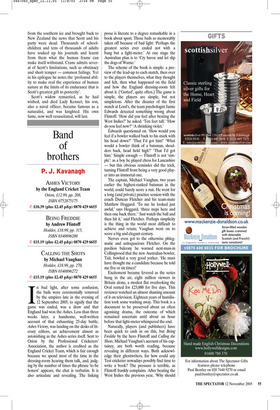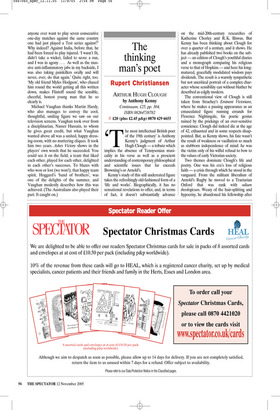Band of brothers
P. J. Kavanagh
ASHES VICTORY by the England Cricket Team Orion, £12.99, pp. 208, ISBN 0752875175 ✆ £10.39 (plus £2.45 p&p) 0870
429 6655
BEING FREDDIE by Andrew Flintoff Hodder, £18.99, pp. 315, ISBN 0340896280 ✆ £15.19 (plus £2.45 p&p) 0870
429 6655
CALLING THE SHOTS by Michael Vaughan Hodder, £18.99, pp. 270, ISBN 0340896272 ✆ £15.19 (plus £2.45 p&p) 0870 429
6655
In bad light, after some confusion, the bails were ceremonially removed by the umpires late in the evening of 12 September 2005, to signify that the game was ended, was a draw and that England had won the Ashes. Less than three weeks later, a handsome, well-written account of that exhausting 25-day battle, Ashes Victory, was landing on the desks of literary editors, an achievement almost as astonishing as the Ashes series itself. Sent to Orion by the Professional Cricketers’ Association, the author is credited as the England Cricket Team, which is fair enough because we spend most of the time in the dressing-room hearing them talk, and, judging by the number of times the phrase ‘to be honest’ appears, the chat is verbatim. It is also articulate and revealing. The linking prose is literate to a degree remarkable in a book about sport. Those bails so memorably taken off because of bad light: ‘Perhaps the greatest series ever ended not with a bang but a light-meter.’ At one stage the Australian plan is to ‘Cry havoc and let slip the dogs of Warne.’ The scheme of the book is simple: a preview of the lead-up to each match, then over to the players themselves, what they thought and felt, then what happened on the field and how the England dressing-room felt about it. (‘Gutted’, quite often.) The game is simple, the players are simple, but not simpletons. After the disaster of the first match at Lord’s, the team psychologist Jamie Edwards detected something wrong about Flintoff. ‘How did you feel after beating the West Indies?’ he asked. ‘Ten feet tall.’ ‘How do you feel now?’ ‘A shrinking violet.’ Edwards questioned on. ‘How would you feel if a bowler walked back to his mark with his head down?’ ‘That I’d got him!’ ‘What would a bowler think of a batsman, shoulders back, head held high?’ ‘That I’d got him.’ Simple enough — Flintoff is not ‘simple’: as a boy he played chess for Lancashire — but this obvious reminder did the trick, turning Flintoff from being a very good player into an immortal one.
The captain, Michael Vaughan, two years earlier the highest-ranked batsman in the world, could barely score a run. He went for a long (and private) practice session with the coach Duncan Fletcher and his team-mate Matthew Hoggard. ‘To me he looked just awful,’ says Hoggard, ‘three steps here and then one back there.’ ‘Just watch the ball and then hit it,’ said Fletcher. Perhaps simplicity is the thing in the world most difficult to achieve and retain; Vaughan went on to score a big and elegant century.
Nerves even got to the otherwise phlegmatic and unloquacious Fletcher. On the pavilion balcony he warned next-man-in Collingwood that the new Australian bowler, Tait, bowled a very good yorker. ‘He must have thought me a candidate because he told me five or six times!’ Excitement became fevered as the series hung in the air, eight million viewers in Britain alone, a modest flat overlooking the Oval rented for £23,000 for five days. This reviewer watched an almost shaming amount of it on television. Eighteen years of humiliation took some washing away. This book is a document to be preserved about an often agonising drama, the outcome of which remained uncertain until about an hour before that light-meter whimpered the end.
Naturally, players (and publishers) have been quick to cash in on this, but Being Freddie by the hero Flintoff and Calling the Shots, Michael Vaughan’s account of his captaincy, are both worth reading, because revealing in different ways. Both acknowledge their ghostwriters, for how could any Test cricketer nowadays possibly find time to write a book? The pressure is terrible, as Flintoff frankly complains. After beating the West Indies the previous year, ‘Why should anyone ever want to play seven consecutive one-day matches against the same country one had just played a Test series against?’ Why indeed? Against India, before that, he had been forced to play injured. ‘I wasn’t fit, didn’t take a wicket, failed to score a run, and I was in agony ... As well as the massive anti-inflammatory jabs in my backside, I was also taking painkillers orally and will never, ever, do that again.’ Quite right, too. ‘My old friend Myles Hodgson’, who chased him round the world getting all this written down, makes Flintoff sound the sensible, cheerful, honest young man that he so clearly is.
Michael Vaughan thanks Martin Hardy, who also manages to convey the cool, thoughtful, smiling figure we saw on our television screens. Vaughan took over from a disciplinarian, Nasser Hussain, to whom he gives great credit, but what Vaughan wanted above all was a united, happy dressing-room, with no muttering cliques. It took him two years. Ashes Victory shows in the players’ own words that he succeeded. You could see it on the field; a team that liked each other, played for each other, delighted in each other’s successes. To blazes with who won or lost (we won!); that happy team spirit, Hoggard’s ‘band of brothers’, was one of the delights of the summer, and Vaughan modestly describes how this was achieved. (The Australians also played their part. It caught on.)




























































 Previous page
Previous page